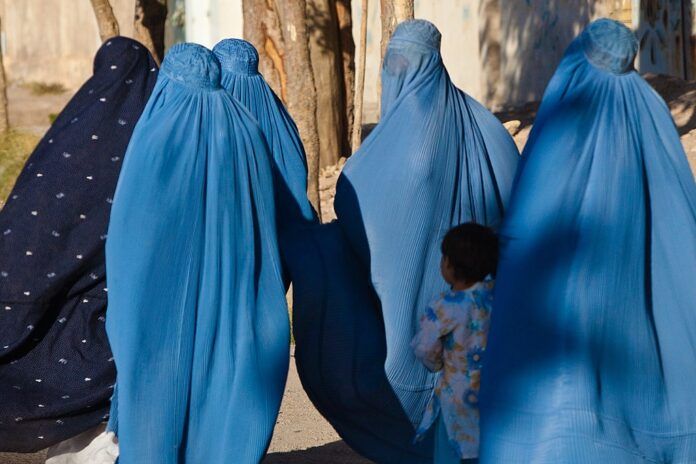Human rights organizations condemn the Taliban’s harsh enforcement of Sharia law.
The Taliban’s recent declaration to reinstate public stonings and floggings as punishments, particularly targeting women for adultery, has sparked widespread condemnation. This move, signalling a return to the oppressive practices of the 1990s, has alarmed international human rights groups and activists who decry the lack of global action against such atrocities.
Safia Arefi, a prominent lawyer and leader of the Afghan human rights group Women’s Window of Hope, expressed her dismay, highlighting the dire situation Afghan women now face. According to Arefi, the Taliban’s announcement ushers in an era of brutal private punishments, leaving Afghan women utterly isolated and vulnerable to the group’s draconian measures.
Embed from Getty ImagesThe Taliban’s supreme leader, Hibatullah Akhundzada, made the chilling announcement through a broadcast, blatantly stating that women found guilty of adultery would face public flogging and stoning. This stark declaration underlines the Taliban’s intention to enforce their stringent interpretation of Sharia law across Afghanistan, disregarding international human rights norms.
Akhundzada’s justification for these severe punishments as a battle against Western influences further demonstrates the Taliban’s resolve to establish and expand their control, disregarding the outcry from the international community and rights organizations.
The enforcement of such extreme measures has not only horrified but also somewhat surprised Afghan women’s rights groups. These groups have witnessed the gradual erosion of rights and protections for Afghan women and girls, fearing that the reinstatement of such punishments signifies a near-total collapse of any remaining liberties.
Human Rights Watch researcher Sahar Fetrat emphasized the growing boldness of the Taliban, noting the incremental implementation of their harsh policies. Fetrat warns that the Taliban’s actions, using Afghan women’s bodies to assert their moral and societal codes, could herald even more severe policies if left unchecked.
Since their return to power in August 2021, the Taliban has systematically dismantled the legal and institutional frameworks protecting women’s rights in Afghanistan. The prohibition on female legal professionals and the dissolution of the Afghan constitution highlights the regime’s disregard for international human rights standards.
Activists like Samira Hamidi, working with Amnesty International, have called attention to the Taliban’s flouting of international human rights laws, including violations of the Convention on the Elimination of All Forms of Discrimination against Women (Cedaw). Hamidi’s remarks underscore the gravity of the situation, with Afghan women left defenceless against such persecution.
Reports from Afghan Witness, a group monitoring human rights in Afghanistan, reveal a disturbing number of public floggings and executions ordered by Taliban judges, underscoring the harsh realities of life under Taliban rule for many, especially women.
This resurgence of brutal, public punishments not only violates international human rights laws but also poses a stark challenge to global norms of justice and dignity, prompting calls for immediate and concerted international action to protect Afghan women and uphold human rights.
